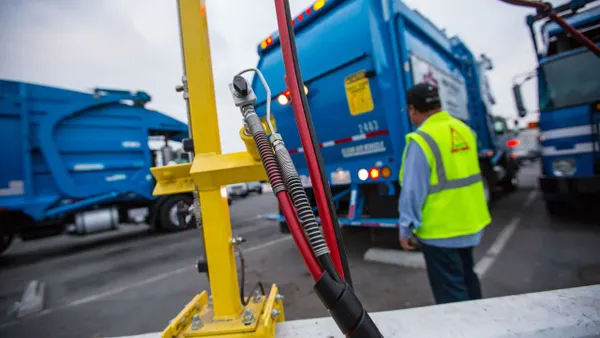Dive Brief:
- Maine enacted a law requiring certain large food waste generators to divert their organic waste from disposal starting July 1, 2030. The bill became law without the governor’s signature.
- The organics diversion mandate becomes more stringent over time. Initially it applies to institutions that generate two or more tons of organic waste per week if they’re within 20 miles of an organics recycling facility. Beginning July 1, 2032, the law applies to locations that generate one or more tons per week within 25 miles of organics recyclers.
- Maine is the 11th state in the U.S. to implement such a law, and the last in New England, according to the Conservation Law Foundation, which testified in support of the bill.
Dive Insight:
Maine joins several states other states where lawmakers have considered or taken action on organic waste. Washington’s governor signed a law in May that makes a host of changes to existing organics diversion requirements. Lawmakers in New Jersey are also considering companion bills that would set a new organics diversion goal and explore opportunities to expand diversion among other changes.
Maine’s LD 1065 was preceded by several commitments state policymakers made to reduce emissions. In 2019, the Maine Solid Waste Management and Recycling Plan placed an emphasis on diverting organics to increase the amount of MSW that is recycled. Subsequent state reports have reaffirmed the importance of organics diversion.
The state has had a goal to divert 50% of its MSW since 1989, but has yet to achieve that mark. Maine's MSW recycling rate was 33.8% in 2022, the most recent year for which data is available.
In 2022, Maine diverted about 21,520 tons of waste to anaerobic digestion, approximately 7,663 tons to composting and some 3,830 tons toward food rescue. That's compared to 952,520 tons of all MSW disposed, either via landfill or waste-to-energy facility.
Waste reduction advocacy group Just Zero said it worked with legislators to draft and build support for the new law in a release published last week.
“This is a huge win for Maine,” Peter Blair, policy and advocacy director for Just Zero, said in a statement. “It marks a turning point in how we think about and manage food. Instead of letting this valuable resource rot in landfills, Maine will work to eliminate needless waste, feed those in need, and fight climate change by investing in composting. This is a smart, comprehensive policy that will benefit everyone in the state.”
A coalition of business groups that includes the Maine State Chamber of Commerce, Maine Hospital Association and Maine Grocers and Food Producers Association opposed the bill. In their testimony, they said affected businesses are already stretched thin by other new requirements, including around packaging extended producer responsibility and PFAS. They also noted DEP had limited resources of its own to implement regulations.
“Adding a statewide food waste mandate on top of those obligations—especially one with reporting and infrastructure demands—compounds the cost and complexity of doing business in Maine,” the groups said in written testimony.
Instead of the law, the coalition proposed DEP strengthen liability protections for food donation, expand solid waste grant programs and make other changes to existing policy to incentivize food waste reduction.
The law also includes a provision instructing Maine’s Department of Environmental Protection to explore increasing the stringency of the requirement by July 1, 2035. The department has the option to include institutions that generate as little as 100 pounds of food waste per week in the rule, though it could exempt such locations from reporting requirements so long as they generate less than one ton per week. It could also include institutions that are farther than 25 miles from an organics recycler with available capacity.











